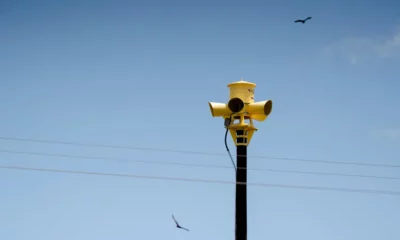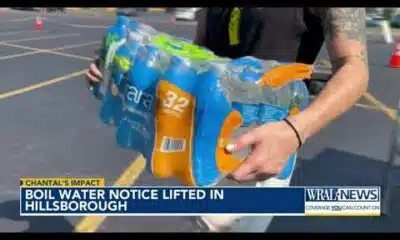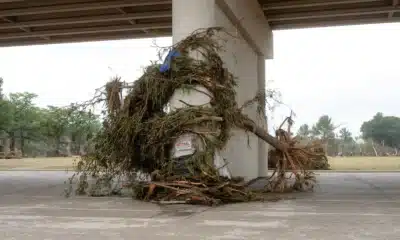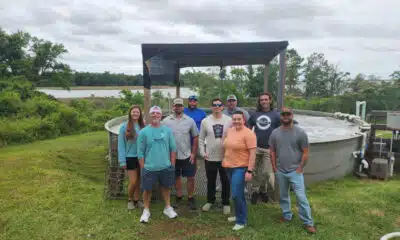News from the South - Arkansas News Feed
Research into biodegradable plastics involves Arkansas scientist
by John Lovett, Special to the Advocate, Arkansas Advocate
April 28, 2025
FAYETTEVILLE, Ark. — While biodegradable plastics currently account for a half percent of the hundreds of millions of tons of plastic produced annually, a growing demand for the alternative reflects consumer awareness and corporate response.
Researchers from Brazil, Germany and the United States document a multi-faceted global snapshot of the environmental aspects and trends surrounding single-use plastics in a review article titled “Rethinking single-use plastics: Innovations, policies, consumer awareness and market shaping biodegradable plastics in the packaging industry.” The piece was recently published in Trends in Food Science & Technology.
The researchers state that the largest area of application for biodegradable plastic materials is the packaging segment, which accounts for about half of single-use plastic production. The biodegradable packaging market was estimated to reach about $105 billion in 2024 with an expected annual growth rate of about 6 percent between 2024 and 2029, and 44 percent of patents filed worldwide for biodegradable polymers relate to packaging, the study noted.
About 474 million tons of plastics are produced globally each year, and about a third of it is used for packaging, including single-use plastic products for food and beverage containers. Of this, only about 25 percent gets recycled. Plastic production, the article adds, is expected to triple by 2060 following a trend of transitioning from durable plastics to single-use plastics.
Global plastic production increased from 369 million tons in 2016 to 404.5 million tons in 2020, partly due to materials used in the COVID-19 pandemic.
Citing a 2021 study from the same research group in Brazil, the review article noted the pandemic “exacerbated the use of single-use plastic and increased the demand for personal protective equipment and packaging, leading to remarkable growth in the plastics industry and generating more than 8 million tons of waste, mainly affecting Asia, Europe and America.” The same study mentions that the pandemic expanded food packaging due to a shift in eating habits and an increase in online purchases.
Despite the transition to single-use plastics, an increasing number of patents and successful research and development of biodegradable plastic materials has sparked the interest of industries to invest in large-scale production technologies for renewable monomers and polymers, the researchers added.
Looking to corn
Barone is supervised by Ana Elizabeth Cavalcante Fai, corresponding author for the review article, a food engineer and associate professor in food science at Rio de Janeiro State University, where she coordinates the Laboratory of Multidisciplinary Practices for Sustainability at the Institute of Nutrition.
“Food packaging plays a vital role in ensuring food safety and quality,” Fai said. “However, it is increasingly unjustifiable to produce short-life cycle packaging using synthetic plastics that persist in the environment for up to 400 years. Even more concerning is the growing awareness that plastics don’t degrade completely — they fragment into micro- and nanoplastics, which are now recognized as widespread environmental pollutants and an emerging public health concern.”
Ferreira said that while biodegradable plastics are a promising long-term alternative solution, it is not where he expects to see the biggest short-term impact on the reduction of overall plastic use.
Fai and Barone said that plastic has undeniably transformed modern life since its mass production began in the 1950s. However, despite its versatility and usefulness, “plastic has often been misused and is frequently applied to single-use items which are discarded with little regard for environmental consequences.”
“Most of the plastic ever made still exists in some form today,” Fai said. “When people say, ‘just throw it away,’ we must remember — there is no ‘away.’ Everything remains within the boundaries of our shared environment. The planet simply cannot absorb this volume of waste indefinitely. If current trends continue, some projections estimate that by 2050, there could be more plastic than fish in our oceans. This is not just alarming — it’s a call to urgent action.”
A “circular economy,” Ferreira said, could have a larger long-term impact on single-use plastic reduction. A circular economy broadens the familiar slogan of “reduce, reuse, recycle” to “rethink, refuse, reduce, reuse, repair and recycle,” in that order.
Brazil has an extraordinary biodiversity, Fai said, and a significant agro-industrial biomass base, rich in polysaccharides such as starch, pectin, lignin, and others. These valuable raw materials can be transformed into bio-based and biodegradable packaging for the food industry, she added.
“Through international partnerships, where each research group contributes its unique expertise, we can join efforts to develop sustainable and innovative packaging solutions,” Fai said. “This collaborative approach is key to building a more sustainable future for food systems worldwide,” said Fai and Barone.
“We are part of the problem as consumers, but at the end of the day, as consumers we can be part of the solution,” Ferreira said.
Co-authors of the review article on single-use plastics include Carollyne Maragoni-Santos of Federal University of the State of Rio de Janeiro; Patricia Marques de Farias of the Sustainable Packaging Institute in Germany; Camila Marcolongo Gomes Cortat of the Laboratory of Multidisciplinary Practices of Sustainability, Institute of Nutrition at the State University of Rio de Janeiro; Bianca Chieregato Maniglia of the University of São Paulo; and Ricardo Schmitz Ongaratto in the chemistry school at Federal University of Rio de Janeiro.
Plastics on the farm
“In our transplant production, rather than using the single-use plastics that you see in a store when you get plants, we use extra sturdy plastic transplant trays,” Friedrich said. “We know farmers who have used these for 20-plus years and are still strong.”
Friedrich said the CAFF farm also uses a paper pot system adapted from Japan that uses a chain of paper strips to form cells in which they grow the transplants. The training farm also uses a landscape fabric instead of plastic mulch for weed control, which can be reused over many years.
However, use of single-use plastic is unavoidable at times. For its “tractor-scale” production, CAFF uses the black plastic seen on strawberry beds at u-pick operations.
“Plants respond well to plasticulture because it warms the soil early, creates a weed free zone and delivers water directly to the plant roots,” Friedrich said. “The current biodegradable options for this function can’t hold up over the long, hot season.”
A thick, clear plastic is used to cover high tunnels at the farm, but that material has a longer lifespan of four to six years. High tunnels differ from greenhouses by generally having less climate control but still allow protection of plants from the elements and extend the growing season from early spring to late fall.
Irrigation drip tape — a flat tubing that provides water directly to plant roots — can also be a source of plastic on the farm, Friedrich said, and they try to use theirs for multiple years to minimize landfill deposits.
“In other areas of the state, there are recycling options that farmers can off-load their irrigation plastic,” Friedrich said.
Polypipe is commonly used for irrigation in row crop operations. When the season has ended, farmers roll up the pipe and drop it off for recycling.
The Center for Arkansas Farms and Food was developed to strengthen and expand our food and farming system by providing new opportunities to shape our current and future farmers, food entrepreneurs and food system leaders. CAFF is a program of the Arkansas Agricultural Experiment Station through the University of Arkansas System Division of Agriculture.
Through experiential learning, the center’s programs train farmers and food entrepreneurs with the production and business skills and resources necessary to develop resilient businesses that sustain our ecosystem, our land and our communities.
GET THE MORNING HEADLINES.
Arkansas Advocate is part of States Newsroom, a nonprofit news network supported by grants and a coalition of donors as a 501c(3) public charity. Arkansas Advocate maintains editorial independence. Contact Editor Sonny Albarado for questions: info@arkansasadvocate.com.
The post Research into biodegradable plastics involves Arkansas scientist appeared first on arkansasadvocate.com
Note: The following A.I. based commentary is not part of the original article, reproduced above, but is offered in the hopes that it will promote greater media literacy and critical thinking, by making any potential bias more visible to the reader –Staff Editor.
Political Bias Rating: Center-Left
This content leans center-left as it emphasizes environmental concerns related to plastics, the importance of sustainable innovations like biodegradable plastics, and the promotion of a circular economy. The narrative highlights scientific research, environmental responsibility, and the need for systemic changes, which align with progressive and environmentally conscious viewpoints. However, it maintains a balanced tone without overtly ideological language or partisan framing, making it more moderate than far-left activism. The article encourages practical solutions and consumer awareness, typical of center-left environmental discourse.
News from the South - Arkansas News Feed
Arkansas National Guard Texas flooding mission extended
by Antoinette Grajeda, Arkansas Advocate
July 14, 2025
Gov. Sarah Huckabee Sanders approved a weeklong extension of active duty for Arkansas National Guard troops assisting officials with recovery efforts in central Texas due to deadly flash flooding.
Twenty-two Arkansas National Guard troops who deployed to the Lone Star State last week were originally scheduled to conclude their work on July 12. They’ll now continue their duties through Saturday, according to a press release.
Arkansas emergency management team to assist with Texas flood recovery efforts
Nearly two dozen troops and four Black Hawk helicopters are assisting with the transportation of search and rescue personnel in central Texas.
In addition to the team of 22 soldiers, which consists of pilots and crew chiefs and six maintenance personnel, two other troops are serving as liaisons in Arkansas to coordinate direct support to deployed soldiers as needed, according to the release. Their mission was also extended through Saturday, though orders may be adjusted based on mission needs.
The Arkansas Division of Emergency Management joined recovery efforts Friday when it deployed a specialized two-person team to Texas that will support resource tracking, documentation, situational awareness and operational reporting, according to an agency news release. Team members will also act as liaisons between Texas and assisting states.
At least 120 people died and 160 remain missing after heavy rains led to flooding in central Texas on July 4, according to The Texas Tribune.
GET THE MORNING HEADLINES.
Arkansas Advocate is part of States Newsroom, a nonprofit news network supported by grants and a coalition of donors as a 501c(3) public charity. Arkansas Advocate maintains editorial independence. Contact Editor Sonny Albarado for questions: info@arkansasadvocate.com.
The post Arkansas National Guard Texas flooding mission extended appeared first on arkansasadvocate.com
Note: The following A.I. based commentary is not part of the original article, reproduced above, but is offered in the hopes that it will promote greater media literacy and critical thinking, by making any potential bias more visible to the reader –Staff Editor.
Political Bias Rating: Centrist
This content presents a straightforward news report on the Arkansas National Guard’s assistance in Texas flood recovery efforts, without evident political commentary or opinion. It focuses on factual information about troop deployment, official actions, and the ongoing disaster response, maintaining a neutral tone typical of impartial reporting. Therefore, it reflects a centrist, neutral political bias.
News from the South - Arkansas News Feed
Bentonville police search for possibly armed man on Crystal Bridges trails
SUMMARY: Bentonville police are investigating reports of a possibly armed man seen on Crystal Bridges trails around noon today. Authorities conducted an extensive search on foot and with drones but did not find anyone. At the time, several areas of Crystal Bridges were restricted to the public, but officials confirmed there is no ongoing danger now. The venue is currently closed as a precaution, prioritizing the safety of members and guests. News teams are seeking more information from local law enforcement and Crystal Bridges, but no further updates have been provided yet. The situation remains under active investigation.
Bentonville police searching for possible armed man
Subscribe to 40/29 on YouTube now for more: http://bit.ly/PTElbK
Get more Northwest Arkansas news: http://www.4029tv.com
Like us: http://facebook.com/4029news
Follow us: http://twitter.com/4029news
Instagram: https://www.instagram.com/4029news/
News from the South - Arkansas News Feed
Congress, state lawmakers move to juice aviation biofuel production
by Allison Prang, Arkansas Advocate
July 13, 2025
Congress’ passage of President Donald Trump’s spending and tax cuts bill this month could help grow the market for sustainable aviation fuel, a nascent industry that could be a boon for corn-producing states as airline operators are betting on it to decarbonize the sector.
The Republican budget reconciliation law that Trump signed July 4 pared back some of the credits for sustainable energy in the law that congressional Democrats passed and President Joe Biden signed in 2022 — the Inflation Reduction Act.
But the recent law extended one energy tax credit for producing clean fuels, such as sustainable aviation fuel, an alternative to the typical jet fuel planes use. The credit initially went through 2027, but the GOP law extends it through 2029.
Advocates for sustainable aviation fuel had been pushing Congress to extend the tax credit to support production as states across the U.S. have passed or proposed their own tax credits to grow the sector and lure production within their borders. Lawmakers in Iowa, Wisconsin, Michigan and New York have introduced bills enacting tax credits for sustainable aviation fuel.
For airlines, increasing availability of the fuel is essential for the sector to meet its net-zero goal for 2050, with the International Air Transport Association estimating the cleaner fuel could get the industry 65% of the way toward its target.
“We’re not yet at commercial-scale production and you need that longer lead time for these types of projects so I think the extension is really key,” said Chris Bliley, senior vice president of regulatory affairs at Growth Energy, a biofuel industry group.
While the credit’s lifetime was extended, others say the environment for sustainable aviation fuel isn’t as favorable as it was just a few years ago. The new budget reconciliation law also included provisions to lower the credit amount for sustainable aviation fuel specifically and clawed back unobligated grant funding to support the sector.
The amount of sustainable aviation fuel that producers make today is far from how much the airline industry needs to be able to use the alternative fuel regularly. U.S. production capacity over the last couple of years, however, has grown, jumping from less than 5,000 barrels per day at the start of 2024 to more than 30,000 by February of this year, according to a May report from the U.S. Energy Information Administration.
Badger State bill
Wisconsin state Rep. David Steffen, a Republican who sponsored a bill to incentivize sustainable aviation fuel, said he learned about a sustainable aviation fuel production company based in Madison called Virent Inc., now a subsidiary of Marathon Petroleum Corp. Virent’s fuel helped power the first domestic flight powered by 100% sustainable aviation fuel in one of its engines.
“I was intrigued that we had this company in our state and I want them and other companies of similar interest to find Wisconsin as their new home,” Steffen said. “It’s a great opportunity for not only the environmental benefits that come with it but for our farmers, dairies and timber producers to access a brand-new market for their product.”
Steffen’s bill also requires that to receive the tax credit, source materials for the fuel must be domestically sourced.
Wisconsin’s legislative session doesn’t end until next March and Steffen said he’s “very comfortable in saying (the bill) will have a clear path to the finish line.” Should it pass in its current state, the tax credit would go into effect in 2028.
Other states
Iowa, Illinois, Minnesota, Nebraska and Washington state all already have enacted laws to provide tax credits for sustainable aviation fuel.
Lawmakers in New York and Michigan have also proposed legislation to create their own tax credits. The New York bill barely moved in the most recent session, while legislation in Michigan has made it out of one committee and been referred to a second.
New York state Sen. Rachel May, a Democrat, plans to re-introduce the legislation next year. She said she wants to amend her bill to offer a larger tax credit for companies making sustainable aviation fuel specifically by mimicking photosynthesis so it doesn’t incentivize diverting feedstock like corn from being used for food, she said.
Her concern is moving the agriculture industry “away from both food production and maybe what might be the best uses of the land,” she added.
Corn ethanol, a common ingredient in automotive fuel, can be used to make sustainable aviation fuel.
Federal extension
While the extension of the federal clean fuels tax credit could be beneficial to the sustainable aviation fuel industry, the new law also lowers the amount of the tax credit for the fuel. It’s now the equivalent to what other biofuel producers qualify for, giving sustainable aviation fuel production less of a competitive advantage.
One version of the budget reconciliation bill also called for extending the tax credit by four years instead of two, but that got scaled back in the version of the bill ultimately signed into law.
The new law also took away any funding not yet obligated as part of a grant program for sustainable aviation fuel and makes fuels derived from feedstocks that come from outside the U.S., Canada or Mexico ineligible for the tax credit.
Despite any limitations, some analysts expect the law will still boost sustainable aviation fuel.
“The Trump administration has yet to outline its approach to SAF, but we expect the fuel to benefit from the administration’s focus on supporting biofuel-producing states,” analysts for Capstone DC, a firm that advises business clients on policy issues, said in a note in late June.
But changes to the federal tax credit could also make states more interested in adopting their own credit to support sustainable aviation fuel, Capstone added.
‘Not nearly as strong’
Tariffs, meanwhile, could also make U.S. feedstocks for producing the fuel more competitive, Paul Greenough, a vice president on Capstone’s energy team.
But Greenough cautioned that sentiment around sustainable aviation fuel still isn’t as rosy as it used to be.
“Momentum still exists for SAF but it’s not nearly as strong as it was under the Biden administration,” he said.
Some climate groups have also expressed concern over changing the clean fuels tax credit at the federal level. The Clean Air Task Force, ahead of the bill becoming law, said extending the credit will largely service other fuels that aren’t sustainable aviation fuel, which will in turn be costlier for the government.
“This purported attempt to incentivize ‘clean fuels’ is little more than a giveaway to the conventional biofuels industry,” the organization said in a post on its website.
Arkansas Advocate is part of States Newsroom, a nonprofit news network supported by grants and a coalition of donors as a 501c(3) public charity. Arkansas Advocate maintains editorial independence. Contact Editor Sonny Albarado for questions: info@arkansasadvocate.com.
The post Congress, state lawmakers move to juice aviation biofuel production appeared first on arkansasadvocate.com
Note: The following A.I. based commentary is not part of the original article, reproduced above, but is offered in the hopes that it will promote greater media literacy and critical thinking, by making any potential bias more visible to the reader –Staff Editor.
Political Bias Rating: Center-Right
This article presents a mostly factual overview of recent legislative actions concerning sustainable aviation fuel (SAF), with a focus on the bipartisan but GOP-led budget reconciliation bill signed by former President Donald Trump. The tone is generally neutral but leans slightly toward a center-right perspective by emphasizing the Trump administration’s role in extending energy tax credits and highlighting support from Republican lawmakers. It also includes critical views from climate groups and notes Democratic legislative efforts, maintaining a balanced presentation. The framing subtly favors market-driven, industry-supported solutions aligned with conservative energy policy approaches, rather than expansive environmental regulation favored by the left.
-
News from the South - Tennessee News Feed2 days ago
Bread sold at Walmart, Kroger stores in TN, KY recalled over undeclared tree nut
-
News from the South - North Carolina News Feed6 days ago
Boil water notice lifted in Hillsborough
-
Mississippi Today5 days ago
Hospitals see danger in Medicaid spending cuts
-
News from the South - Texas News Feed5 days ago
Why Kerr County balked on a new flood warning system
-
News from the South - Arkansas News Feed7 days ago
Arkansas Department of Education creates searchable child care provider database
-
News from the South - Arkansas News Feed7 days ago
Arkansas National Guard deployed to Texas to assist in flooding response
-
News from the South - Texas News Feed6 days ago
Sheriff hints at ‘after action’ review, as records reveal warning of ‘worst-case flood event’
-
Our Mississippi Home7 days ago
MDMR-USM Hatchery Training Program Enters Production Phase with Oyster Spawning and Mobile Unit Launch











































